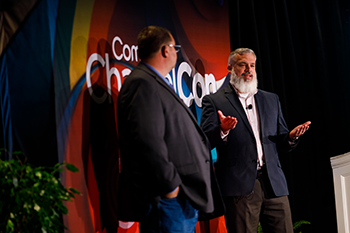 From blockchain to drones, AI and IoT to space internet, ChannelCon 2019 featured the latest conversations in emerging technologies and the opportunities and challenges around implementing and monetizing new technology solutions.
From blockchain to drones, AI and IoT to space internet, ChannelCon 2019 featured the latest conversations in emerging technologies and the opportunities and challenges around implementing and monetizing new technology solutions.
The Pros (and Cons) of Space Internet
Chelsea Gohd, science writer, and Patrick Nelson, author of the Disrupter blog on Network World, discussed the future of access to the internet in the session Space Internet: Are We Almost There Yet? Companies like SpaceX and OneWeb have already launched satellites for space internet programs with Amazon also planning to enter the race. Space internet represents a leap forward in accessibility as well as speed, connecting parts of the world that either have no access to internet or access to unreliable internet, which means huge improvements in communication, education, medical care and more.
“Aside from regular communication, emergency communication is a huge piece to the positive side of space internet,” said Gohd.
But the response to space internet hasn't all been positive. As companies see it as an opportunity to advertise to more people, users have become more wary about who is using their data and how.
Opportunities for the Channel to Embrace Blockchain
 Is blockchain right for your business? Maybe, said Neeraj Satija, CEO/CTO, Concordus Applications Inc., and Adam Lesh, vice president of technology, Breaker, and CompTIA Blockchain Advisory Council member (pictured left) in Blockchain Adoption: Hype vs. Reality. According to the speakers, blockchain is still most known for cryptocurrency, but the use cases for it go far beyond Bitcoin and Ethereum, and include projects such as smart contracts, fintech, IoT, voting and more. But it’s important for companies to carefully research the technology before taking the plunge.
Is blockchain right for your business? Maybe, said Neeraj Satija, CEO/CTO, Concordus Applications Inc., and Adam Lesh, vice president of technology, Breaker, and CompTIA Blockchain Advisory Council member (pictured left) in Blockchain Adoption: Hype vs. Reality. According to the speakers, blockchain is still most known for cryptocurrency, but the use cases for it go far beyond Bitcoin and Ethereum, and include projects such as smart contracts, fintech, IoT, voting and more. But it’s important for companies to carefully research the technology before taking the plunge.
“A lot of companies start working with blockchain without understanding the relevance for their use case, and it’s not suitable to every use case,” said Satija. “When people embrace blockchain without due diligence, they run into the disruption of organizational workflow.”
After determining that your business could benefit from blockchain, Satija provided the following advice: “Fail fast. Plan small use cases, fail with the small projects, learn from that and build on it.”
IoT Makes a Case for Profitability and Sustainability
How do you make money in IoT? According to Steve Roos, vice president of engineering, TBI, Inc., and Ted Cole, vice president of channel and strategic partners, GPS Insight, you need to solve a problem, create efficiencies or save your customers money.
“The money in IoT for MSPs is providing a solution and building relationships,” said Roos.
Roos and Cole also presented use cases that showed that IoT can both make a company money and provide sustainable solutions for its customers. For example, GPS Insight provides IoT for fleet management. Customers are able to improve fuel efficiency, examine resource allocation in order to put fewer vehicles on the road, and increase route optimization.
Companies Need a Framework for Building Trust
Trust and ethics have become a huge conversation in emerging technology topics, in particular for AI. In Building Trust in an Age of AI and Data Science, Ashwin Krishnan, COO and tech ethicist at UberKnowledge, suggested that companies implement a framework to help create a culture of trust between customers and businesses.
The AEIOU framework stands for armor—determining the security of data; envelope—how the data is being protected; intention—what the data is being collected for; option—giving customers the opportunity to opt-out; and ubiquity—a standard set of guiding principles.
“People are getting more aware of what they are giving up. As awareness rises, companies are going to be put to the test. And it's not just Mark Zuckerberg. Every company is in the same boat,” said Krishnan.
Drones Have More Use Cases Than Ever
The applications for commercial drone implementations is growing daily. Adam Gittins, general manager, HTS Ag, and John Vernon, CTO, DroneUp, discussed today’s drone applications, including use cases in agriculture, transportation, construction and energy in the Real-World Drone Implementations and Best Practices session.
“When your customers come to you, they won’t say, ‘Hey, I want drone solution.’ They say, we have a problem and we need to save money, how do we solve it—what are some creative ways? If it’s something that needs a camera, if you need to get over it, if you need to get inside of it, those are use cases for drones,” said Vernon.
Vernon and Gittins also shared highlights of the Drone Advisory Council’s recently released Drone Standards and Best Practices, which were created to help improve the relevance, quality and consistency of drone service delivery.
Want more ChannelCon 2019? Check out our coverage of daily highlights, educational tracks and general sessions.


 Add CompTIA to your favorite RSS reader
Add CompTIA to your favorite RSS reader
